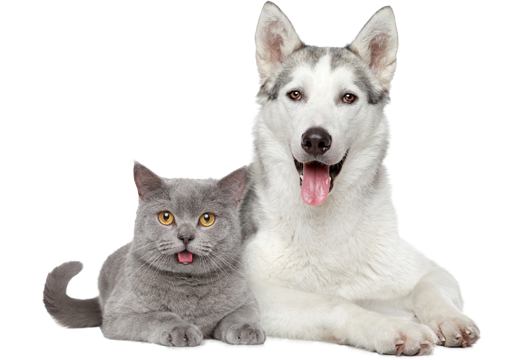Gingivitis
Calculus (or tartan) and gingivitis pose a serious threat to the health of our pets.

Bad teeth
There are many animals with an (unnecessary) short life and experience a lot of discomfort by undetected or poorly treated disease of the teeth.
Many owners think it’s normal for an eight year old poodle to loose his teeth: “He is already old, his teeth begin to fall out!”
The relationship between the animal and it’s owner is quite put to the test by tartar and gingivitis, because of a smelly breath and irritation, to the dog that used to always give ‘kisses’ which now is allowed no more. Dogs say ‘hello’ by sniffing and licking, and if their breath smells, they are blocked in the expression of their normal behaviour. It’s horrible that, at the moment one finally decides to have to do something about it, much damage can not be repaired, and many teeth are lost. In animals in the wild you can’t almost find tartar and gingivitis. Therefore, these defects at dogs’ teeth, should surely be the result of the food that is given by us!
Tartar is produced by mineralisation of plaque. Plaque is a paste-like substance, which is formed continuously on the teeth, and consists of live and dead bacteria, mucosal cells, food etc. Tartar in itself is not a disease, but provides an ideal breeding ground for bacteria, which are responsible for periodontal diseases. Periodontal disease is a disease process that occurs around teeth, which leads to loss of tooth or molar, because the bone, that holds the tooth, is lost. The presence of tartar is merely a symptom of periodontal disease. The disease occurs, because bacteria grow in food and saliva debris below the gum edges (in the sulcus). The body reacts to the bacteria with an invasion of white blood cells, and thus inflammation. As a result, an inflammation develops around the tooth. This inflammation causes the degradation of the bone that holds the tooth in place. With tartar and gingivitis you often hear talk about gums that ‘pull back’. In fact, this happens because the gum is stuck to the underlying bone, which is dissolved during the “war” between the white blood cells and bacteria in the plaque under the gums.
Periodontal disease is a widespread disease; about 85% of adult dogs suffers from it. It is a disease that’s in principle life threatening, and which can be prevented and cured. Because the oral mucosa are highly vascularised, bacteria spread easily throughout the body, where they nestle easily in liver, kidneys, heart valves and joints. In dogs (and also in human!) is non-congenital valvular heart disease almost always the result of inflammation of the gums!
Dental care
Most people realise the importance of their daily dental care, because the teeth have to last approximately 60 to 80 years. Compare this to a dog that at the age of 8 already lost all his teeth. Possibly you know you’re your own experience, how annoying pain is in the oral cavity, whether by gingivitis or because of an infected molar. Consider an animal that cannot say anything, and sometimes lives for years with this kind of problem. The quality of life of such an animal gets more worse, and every owner has the moral obligation to do something here (or let it done).
In addition to periodontal disease, trauma is a major cause of dental problems. Think of the broken fang of a police dog. Also abscesses over the 4th premolar (the largest tooth) in the upper jaw of dogs, often develop a (barely visible) fracture in this. This tooth is indeed the place where the drain passage of the parotid gland, ends. This saliva contains a lot of lime, and therefore we see the most tartar precisely in this tooth. Gingivitis and/or dental problems are sometimes caused by diseases. Dogs with serious mouth problems should actually be examined for the following diseases:
- In diabetes, the glucose in the saliva increases significantly. Because of this, in itself harmless, bacteria find their opportunity to grow significantly. Since diabetes also reduces the immune system of the animal, infections can easily occur in the oral cavity.
- A decreased function of the thyroid (hypothyroidism) often leads to dental problems, and dogs with established hypothyroidism, should also be looked at the teeth! A too small thyroid function is manifested by slowness/lethargy, obesity, skin problems and reduced resistance to infection.
- Allergies and other diseases, with results that animals chew their fur, can cause it to produce hairs accumulate in the sulcus and are results in infections and much damage. Chewing hair can push teeth from the normal position and teeth show wear accelerated.
- Kidney disease may result in dental problems by decalcification of the bone, and so weaken the tooth sockets. In addition, it can cause to sores in the oral cavity. Improper diet can have a huge effect on the teeth, because many foods promote plaque deposition, especially canned food. Too much phosphate in the diet (pure meat) allows for decalcification of the bone and thus a weaker set of teeth. Hill’s Prescription t/d prevents tartar formation.
- Pica (= eating foreign objects) may result in dental problems. Chew on stones, fences, doors, steel, bones etc. is simply not good for their teeth! Dogs who often play with tennis balls have sometimes enormous wear on the teeth: the sand between the “bristles” of the tennis ball acts as sandpaper!
